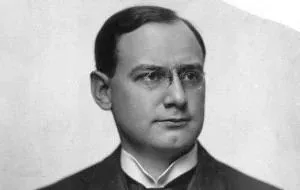
PIKE CO. Mo — Clark faced Missouri challenger in presidential bid
Editor’s note: Following is the third part of a story series by contributing writer Brent Engel.
The question for Missouri Democrats in 1912 was not whether Champ Clark would run for president.
It was “Can he beat former Gov. Joseph Folk?”
After months of conjecture, the Bowling Green lawyer and Speaker of the House of Representatives finally made his formal announcement on Jan. 27 – three weeks before the party’s state convention.
Folk was nicknamed “Holy Joe” for his piety and adherence to the law. He had been endorsed for president by Democrats, including Clark, in 1910. That was before the congressman ascended from just another legislator to being constitutionally a couple of tragedies away from occupying the White House.
Folk supporters tried to make sure Democrats kept their pledge from 1910, while Clark backers said it was no longer a factor.
The Louisiana Press-Journal unsurprisingly said there had been “marked changes in political conditions” since the 1910 pledge, and that Clark had “become a real potential quantity as a presidential candidate.” Clark snarled when asked by a reporter if the pledge should be honored.
“That’s the same guff they’ve been handing out for the past six months,” he said. “There is nothing new in that.”
Though Clark was gaining momentum, the battle with Folk threatened party unity. The St. Louis Post-Dispatch couldn’t help but joke about the drama.
An editorial told the story of two men having a conversation. One said he had played a trick on an unsuspecting creditor by stopping payment on a check.
“Like Champ is trying to do to Folk, eh?” the other man said.
Other scribes printed musings that were downright weird. A Utah newspaper said a chicken had laid two eggs each inscribed with the letter “c.”
“This can mean nothing else but Champ Clark for President,” it wasted ink upon.
The fracture finally led to an odd agreement that was brokered by a man who would soon earn the boundless wrath of Clark supporters.
William Jennings Bryan of Nebraska had failed three times to be elected president, but he still was the most powerful Democrat in the nation.
Bryan proposed that Clark and Folk split the Missouri’s 36 delegates to the 1912 Democratic National Convention in Baltimore. All were to back Clark for the presidential nomination. – unless it appeared he could not win. If that happened, Folk supporters could vote for another candidate.
Because there later were charges that Bryan sabotaged Clark’s candidacy, the proposal could in hindsight be seen as dubious premeditation by the man known as “The Great Commoner.”
Bryan would claim he switched allegiance from Clark to Woodrow Wilson because the New Jersey governor was more progressive and had a better chance of beating incumbent Republican William Howard Taft and Bull Moose Party candidate Theodore Roosevelt.
In any event, Clark and Folk agreed to the plan. Although Folk was said to have doubts, both men put on a positive spin.
“I am especially anxious that there should be harmony and cooperation among the Democrats of Missouri,” Clark offered.
“I heartily concur in the sentiment that personal ambitions should be subordinated to the interest of our party in Missouri,” Folk added.
Next time: Something unexpected?